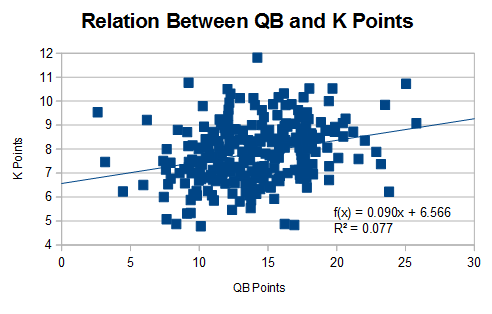This article is part of our The Stats Room series.
The idea seems to work in theory. But how about in practice? … Not so well.
Here's the background information on the study: I looked at kickers and quarterbacks who were paired in at least 12 games during a single season from 2000 to 2015. I didn't want players matched up when one or the other's team role was in flux — if a fantasy owner is going to use this strategy, he is going to established players. Also, I used a standard scoring format for the fantasy points (FP).
Let's start with a basic understanding of these QB-K combos. One idea that can be put to rest is that a high-scoring quarterback means his kicker will score a lot more points. Here is a graph of the average number of points they both score when paired together.

While there is some increase in the number of points scored for the kicker as the quarterback's points increase, the change isn't much. The average number of QB points per game was about 14
The idea seems to work in theory. But how about in practice? … Not so well.
Here's the background information on the study: I looked at kickers and quarterbacks who were paired in at least 12 games during a single season from 2000 to 2015. I didn't want players matched up when one or the other's team role was in flux — if a fantasy owner is going to use this strategy, he is going to established players. Also, I used a standard scoring format for the fantasy points (FP).
Let's start with a basic understanding of these QB-K combos. One idea that can be put to rest is that a high-scoring quarterback means his kicker will score a lot more points. Here is a graph of the average number of points they both score when paired together.

While there is some increase in the number of points scored for the kicker as the quarterback's points increase, the change isn't much. The average number of QB points per game was about 14 with more than 85 percent of the average QB points being within five points of the average mark. Using the best fit line from the graph above, the average change for those five points is +/- 0.45 points a week. It is a small difference, but not a ton.
Now, let's divide these pairings. By how much more do high-powered passing attacks score QB points and what about the kickers on these teams? Does the team's passing attack have an influence on the kicker?
The average number of weekly passing yards was 225 with a standard deviation of 40 points. I decided to look at matched pairs where the QB threw for more than 265 yards (average plus one standard deviation), between 185 and 265, and less than 185 (average minus one standard deviation).
| QB | K | COMBINED | |
| > 265 Pass Yds | 18.1 | 8.3 | 26.4 |
| 185 to 265 Pass Yds | 14.2 | 7.8 | 22.3 |
| < 185 Pass Yds | 9.9 | 7.5 | 17.4 |
No surprise with these numbers. The small differences in kicker values are noticeable, but not as an extreme value.
Now the hard part — figuring out how to determine if the combination has less variation then each individual value.
One way to look at this information is to see how much each of the three point totals (quarterback, kicker and combination) deviated week to week. For this analysis, I looked at each of three groups standard deviations.
| QB | K | OVERALL | |
| > 265 Pass Yds | 7.2 | 3.9 | 8.7 |
| 185 to 265 Pass Yds | 6.7 | 3.9 | 8.4 |
| < 185 Pass Yds | 6.6 | 3.9 | 8.2 |
This is not the best way to examine the data (better method coming), but look at the kicker column. As quarterbacks increase or decrease their levels of consistency, the consistency of kickers stays the same. They have an average standard deviation of 3.9 points no matter if the quarterback is good.
Now, the final set of data. Here I divided the three quarterback groups (high-, medium- and low-yardage passer) into four groups, high and low passing and high and low fantasy point scoring. What I want to see is if a kicker could try to make up the difference from the quarterbacks production. Here's the data:
| HIGH PASSER QB | HIGH PASSER K | MED PASSER QB | MED PASSER K | LOW PASSER QB | LOW PASSER K | |
| Average | 18.1 | 8.3 | 14.2 | 7.8 | 9.9 | 7.1 |
| Low Scoring (< 14 FP) | 9.2 | 7.2 | 8.4 | 7.1 | 6.5 | 6.8 |
| High Scoring (>14 FP) | 21.6 | 8.6 | 19.9 | 8.5 | 19.2 | 7.4 |
| Low Passing < 225 Yds | 11.2 | 7.8 | 10.6 | 7.3 | 8.1 | 7.0 |
| High Passing > 225 Yds | 20.2 | 8.4 | 17.8 | 8.4 | 17.0 | 7.9 |
| Low FP, Low Yds | 8.4 | 7.3 | 7.6 | 6.9 | 6.1 | 6.8 |
| High FP, Low Yds | 16.9 | 8.9 | 17.9 | 8.2 | 18.0 | 7.7 |
| Low FP, High Yds | 10.4 | 7.3 | 10.6 | 7.5 | 10.5 | 7.1 |
| High FP, High Yds | 22.1 | 8.6 | 20.7 | 8.7 | 20.6 | 7.9 |
Every instance when the quarterback performed better in fantasy points, so did the kicker. The most telling two rows are the last two. In these instances, when the quarterback has above-average passing yards but doesn't score many fantasy points, the kicker doesn't get more points from possible field goals.
Again, kickers paired with high-scoring quarterbacks also score more points. But the maximum kicker point range is little more than 3.0 FP for the above values. So, there is some difference, but probably not enough to really worry about it.
Conclusion
After looking over the data, my theory on QB-K is worse than a non-theory, it was wrong. There's no indication that a kicker will score more points from possible field goals if a high-octane passing offense is kept out the end zone. Instead, the opposite is true. If an offense doesn't score touchdowns, the kicker doesn't score, either.
If an owner wants to take anything from the data, he should look at targeting kickers on teams expected to score a bunch of touchdowns in a given week.










